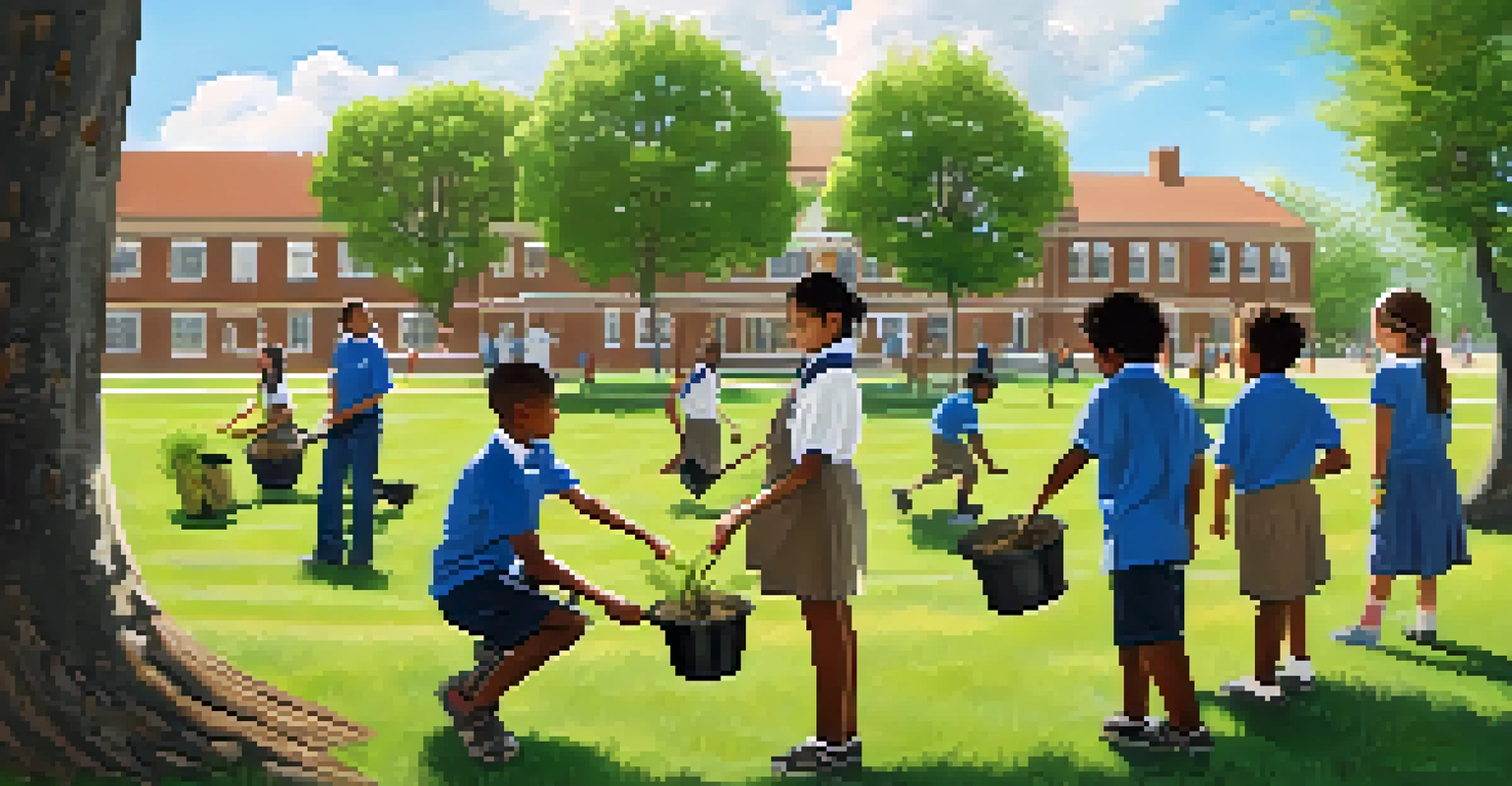Private Education in New Jersey: Options and Opportunities

Understanding Private Education in New Jersey
Private education in New Jersey offers a diverse array of options for families seeking alternatives to public schooling. With a mix of religious, independent, and specialized institutions, parents can find an environment that aligns with their educational values. The state boasts over 1,200 private schools, each with its unique curriculum and teaching philosophy.
Education is the most powerful weapon which you can use to change the world.
These schools often emphasize smaller class sizes and personalized attention, which can lead to a more tailored educational experience. Many private institutions also incorporate innovative teaching methods and curriculums that focus on critical thinking and creativity. This can be particularly appealing for parents who want to ensure their children receive a well-rounded education.
In addition, private schools in New Jersey often have the flexibility to adapt their programs to meet the needs of individual students. Whether a child excels in the arts, sciences, or athletics, there are private schools that can nurture these talents. This adaptability can be a significant advantage for families looking for specific educational pathways.
Types of Private Schools Available
The landscape of private education in New Jersey is rich with variety, including parochial schools, independent schools, and Montessori programs. Parochial schools, often affiliated with religious organizations, provide a faith-based education alongside standard academic subjects. For many families, this dual focus on spirituality and academics is a compelling reason to choose these institutions.

Independent schools, on the other hand, operate without religious affiliation and often emphasize progressive education models. These schools may offer specialized programs like International Baccalaureate (IB) or Advanced Placement (AP) courses, catering to academically driven students. This diversity allows parents to choose schools that best fit their children's learning styles and aspirations.
Diverse Options in Private Schools
New Jersey offers over 1,200 private schools with various educational philosophies, including religious, independent, and specialized institutions.
Montessori schools are another popular option, focusing on child-led learning and hands-on experiences. This method encourages students to explore their interests at their own pace, fostering independence and self-motivation. For parents seeking a more experiential approach to education, Montessori can be an attractive choice.
The Role of Tuition and Financial Aid
Tuition rates for private schools in New Jersey can vary significantly, with some institutions charging upwards of $50,000 per year. This financial commitment can be daunting for many families, but it’s important to remember that there are options for financial assistance. Many private schools offer scholarships, sliding scale tuition, and financial aid packages to help offset costs.
The beautiful thing about learning is that no one can take it away from you.
Understanding the full financial picture is crucial when considering private education. While some schools may appear expensive, they often provide resources and opportunities that can justify the cost, such as advanced placement courses, extracurricular activities, and college counseling. Parents should carefully evaluate the long-term benefits of the investment in their child's education.
Additionally, some states, including New Jersey, have programs that provide tax credits or deductions for private school tuition. This can further alleviate the financial burden on families and make private education more accessible. Exploring these options can open doors for many students who might otherwise not attend private schools.
Academic Performance and College Preparation
Private schools in New Jersey often pride themselves on high academic standards and excellent college preparatory programs. Many institutions boast impressive college acceptance rates, with graduates frequently attending prestigious universities. This track record can be a powerful motivator for parents considering private education for their children.
The focus on rigorous academics is often complemented by a wide range of extracurricular activities, including sports, arts, and leadership programs. These opportunities help students develop a well-rounded skill set that colleges value. Additionally, private schools frequently offer personalized college counseling services, guiding students through the application process and helping them find the right fit.
Financial Aid Opportunities Available
Despite high tuition rates, many private schools provide financial assistance options like scholarships and sliding scale tuition to make education more accessible.
Moreover, the smaller class sizes commonly found in private schools allow for more individualized attention from teachers. This can lead to deeper engagement in the learning process and better preparation for higher education. Parents often find that this tailored approach significantly enhances their child's academic success.
Social Environment and Community Involvement
The social environment in private schools can be a key factor for families considering this educational path. Many parents appreciate the close-knit communities that private schools foster, which can lead to lasting friendships and strong support networks. These environments often encourage collaboration and teamwork, providing students with valuable social skills.
In addition, private schools often emphasize community service and civic engagement. Many institutions require students to participate in volunteer work, instilling a sense of responsibility and empathy. This focus on service can be a significant benefit, helping students develop a strong moral compass as they grow.
Furthermore, private schools frequently organize events and activities that promote parental involvement. From fundraising galas to volunteer opportunities, parents can engage with the school community in meaningful ways. This partnership can create a supportive environment that enhances the overall educational experience.
Choosing the Right Private School for Your Child
Selecting the right private school for your child can feel overwhelming, but a thoughtful approach can simplify the process. Start by identifying your child's unique learning style, interests, and needs. This self-reflection can help narrow down schools that offer programs and environments aligned with your family values.
Visiting potential schools is crucial; it provides a firsthand look at the campus culture and allows you to meet teachers and administrators. Open houses and tours can give insights into the school's atmosphere and whether it feels like a good fit for your child. Don’t hesitate to ask questions about curriculum, class sizes, and extracurricular offerings.
Focus on Academic Success
Private schools in New Jersey are known for their rigorous academics and strong college preparatory programs, often resulting in high acceptance rates to prestigious universities.
Finally, trust your instincts. While rankings and reputations are important, the best school for your child is one where they feel comfortable and inspired to learn. Engaging your child in the decision-making process can also empower them and ensure their needs are met.
Future Trends in Private Education in New Jersey
As we look to the future, several trends are shaping private education in New Jersey. One significant development is the increasing integration of technology into the classroom. Many private schools are adopting blended learning models that combine traditional teaching with online resources, catering to the digital-savvy generation.
Another trend is the rise of specialized programs targeting specific interests, such as STEM (science, technology, engineering, and mathematics) or the arts. Schools are recognizing the importance of these fields and are creating curricula that foster creativity and innovation. This can further enhance students' readiness for future career opportunities.

Moreover, the ongoing conversations around diversity, equity, and inclusion are prompting many private schools to reevaluate their admissions processes and community practices. Families are increasingly looking for schools that reflect their values in these areas, making it a crucial factor when selecting a private school. As these trends continue to evolve, private education in New Jersey will likely adapt to meet the changing needs of families.